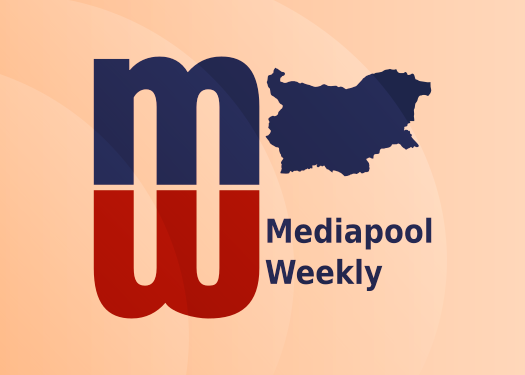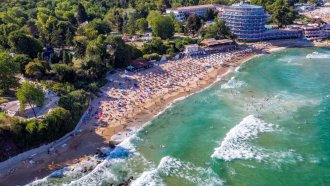Commentary:
In an unprecedented move Specialized Court produces twenty-year sentence for Ivancheva
The the Specialized Court proved it is dangerous and should be shut down along with all other specialized bodies

Dessislava Ivancheva (left) and Bilyana Petrova (right)
The Specialized Court, which deals with cases of high-level corruption, organized crime and the like, made an unprecedented overkill of a ruling this week. Judge Ivan Hinov sentenced former mayor of Mladost Dessislava Ivancheva to 20 years in prison for asking for a bribe from real estate developer Alexander Vaklin. Her former deputy, Bilyana Petrova was found guilty of being Ivancheva’s accomplice and sentenced to 15 years. Petko Dyulgerov got 12 years for being the middle man, who negotiated with Vaklin.
This is not only an unprecedented sentence but in fact managed to achieve the exact opposite of what both the prosecutors and the court have been desperately trying to convince all of us: that it follows the rule of law and is not a political tool.
But it proved the exact opposite. From their inception, the specialized bodies – Specialized Court, specialized Prosecution and the Anticorruption Commission – have carried a risk of being used as political repression tools. And they have, time and time again. But this sentence is so surreal, it actually makes the fact of Ivancheva, Petrova and Dyulgerov’s guilt unimportant, even irrelevant. Because it determined without a shadow of a doubt, and it unambiguous terms, that these institutions tend to be arbitrary by nature and should be eliminated immediately. If we reset the question to the beginning, why even have specialized courts for organized crime and corruption at all, right? Unless you feel the ‘normal’ court procedures can’t provide the punishment you seek. And, of course, how could they not be used politically?
Judge Hinov is due to provide detailed explanation as to the reasoning for the ruling in a month, at which time many questions and uncertainties might receive their answer, but for the time being there are still several very important points to be made regarding this judgment. Again – a disclaimer – as far as we know for now. But, as I said, the guilt here is hardly important.
The arrest
One of the reasons this case has received such public attention is the way authorities have treated Ivancheva and Petrova from the very start. Their arrest was an over-six-hour spectacle of significant proportion at a busy intersection in the city center. The two women stood handcuffed during this whole time surrounded by masked policemen, prosecutors and members of the Anticorruption Commission. They had no lawyer for this period and were plainly humiliated without any regard for their human dignity, presumed innocence and so on trivialities.
The authorities had found 56’000 euro marked bills in the women’s car. They had ‘lit like Christmas lights’ one prosecutor told reporters at the time. Meaning, they had touched the bills, which prosecutors used to argue the two were aware of the money; they were not planted as the defendants would later claim.
The authorities claimed that the style in which they carried out the arrest was necessary in order to secure the evidence the prosecutors needed. In no way, they claimed, did the extreme measures, for which the European Court of Justice (among other things) will have to decide whether they violated human rights, were taken for any other reason. Later the Deputy Chief Prosecutor said about the body of evidence (including those collected at the time of the arrest) “any prosecutor’s dream”. So, one would expect form all of this something of the following: authorities may have crossed a line, but they manage to build an air tight case against Ivancheva and Petrova, right? Wrong.
Judge Hinov found Ivancheva guilty only of asking for the bribe. He found her not guilty in receiving it. And the arrest, and the marked bills and the overall excessiveness of force used were precisely what prosecutors claimed was the reason they could prove without a doubt that she received the bribe. Hinov went a step further in acknowledging the arrest was over the top: he awarded Ivancheva a compensation of 10’000 leva for rights violations. While, mind you, the European Court for Human Rights is looking into rights violations against the two during the arrest and time in jail. Hinov’s ruling might by the way come in handy in this case.
Further suspension: treatment in jail
Petrova and Ivancheva were kept in jail for an – again – unprecedented 7 months before being released under house arrest. From the very first hearing in court they were treated with the highest possible security measures: locked behind a sound-proof grass cube in court, cuffed across the legs and hands when taken to hospital. The security measures were just as over-the-top as the arrest. Soundproof cubes are over cuffing is rarely, if ever, seen in Bulgaria. The reason: they are meant for extremely dangerous criminals, who pose physical risk to those around them.
Still, around Christmas the two were let go under house arrest. Judge Hinov had ruled to that effect three times. Twice the court of appeals reversed the ruling. The reason? “Risk of criminal behavior”.
These reversals provoked the interest of the head of the Supreme Court, who appointed a special inquiry. It determined violation of procedure in both reversals. Maybe this helped for the ruling to be carried out the third time around.
Now Judge Hinov has some new reasoning regarding where the two women should await their sentence and prepare their (surely) appeals: in jail. The reason? We know of two. One, the women do not find their sentences to be just (?!). Two, they have public support and someone might help them escape (??!). Dyulgerov doesn’t have either the support of the public, nor his family, so he may be let under house arrest.
Body of proof: witnesses’ testimonies
Over the course of the year, the prosecutors boasted about their case being air tight not only on account of the physical evidence gathered but also about testimonials as well.
Apart from Vaklin, the witness, whose testimony prosecutors talked countlessly to reporters about was Petko Dyulgerov’s. His story was most damaging at first but later slowly deteriorated over the course of the trial. As middle man, he confessed suitably and, according to prosecutors, told the whole story about Ivancheva’s bribe in detail. The first blow to this very damaging testimony was that not a single witness testified that Ivancheva or Petkova ever talked about a bribe themselves. The most important witness in the case, Alexander Vaklin, also testified that he himself have never spoken to Ivancheva about the money. His conversations were only with Dyulgerov.
This doesn’t itself mean Ivancheva asked for the money somehow or not. But it is definitely a huge step back from what the prosecutors and investigators claimed for much of the time. Over the course of the trial experts concluded that a piece of physical evidence against Ivancheva – some writing in her journal, which was connected to the bribe – was actually falsified: the handwriting was not Ivancheva’s. In the last days before the court was due to make its ruling Petko Dyulgerov withdrew his testimony altogether and said to the court he gave it under pressure from officials from the Anticorruption Commission.
The real problem underlying the severity of the sentence, security measures, as well as the unprecedented swiftness of the court proceedings (one year almost to the day between the arrest and court verdict) is that all these elements make it very hard to believe the court is impartial. Because there is one crucial difference between Ivancheva and anyone else with grounds for similar proceedings: she is not a member of GERB.
This is why after producing a twenty-year sentence for asking for a bribe shifted the gravity of the problem far away from Ivancheva’s actual guilt. The court clearly demonstrated that it is out for blood. But the only way it could be presented with such a choice in the first place is if it is a political tool. Not only that. Because this could have easily be achieved with less than half of the sentence. It would’ve been enough to send a message, to punish Ivancheva mainly for her non-GERB-ness, and finally be able to point to this case and claim you are fighting corruption is real terms. Given the fact that verdicts for anything above low-level corruption are practically non-existent, especially those which survive the Supreme Court, any effective prison time over several years would’ve sufficed, really.
But there is another message here. And that is that those in power and their repressive institutions don’t mind demonstrating brutal tactics in plain sight. And the amount of brutality and punishment outside any norm or practice is reminiscent of something PM Borissov cynically accused his enemies: a crawling dictatorship. Only it’s not them, it’s him. And it isn’t crawling either. It’s triumphant.
In other news:
Lukoil fires Bulgarian branch head Valentin Zlatev

Valentin Zlatev
Valentin Zlatev is no longer head of Lukoil Bulgaria. The decision was taken Friday by the mother-company Lukoil Europe Holdings, which is based in the Netherlands. The motives for the sudden removal of Zlatev are unclear. Bulat Subaev will be taking his place.
Valentin Zlatev has been the head of Lukoil Bulgaria since 1999. According to Mediapool sources the reason for Zlatev’s removal have to do with an internal investigation about draining the company’s assets in Bulgaria. Zlatev will remain in the company though and will head the supervising council: a position, which according to sources is unimportant, although the company’s public relations office is painting it as significant.
Sources tell Mediapool that Lukoil initiated the internal investigation after the investigative journalist site Bivol.bg published a report of an elaborate real estate fraud, connected to the infamous GP Group company and Zlatev. According to Bivol part of the scheme involved Zlatev acquiring lands for a fraction of their market price and then selling them to Lukoil for a significant profit.
Heads of the National Road Company and transport engineering company Trace accused for Svoge bus accident
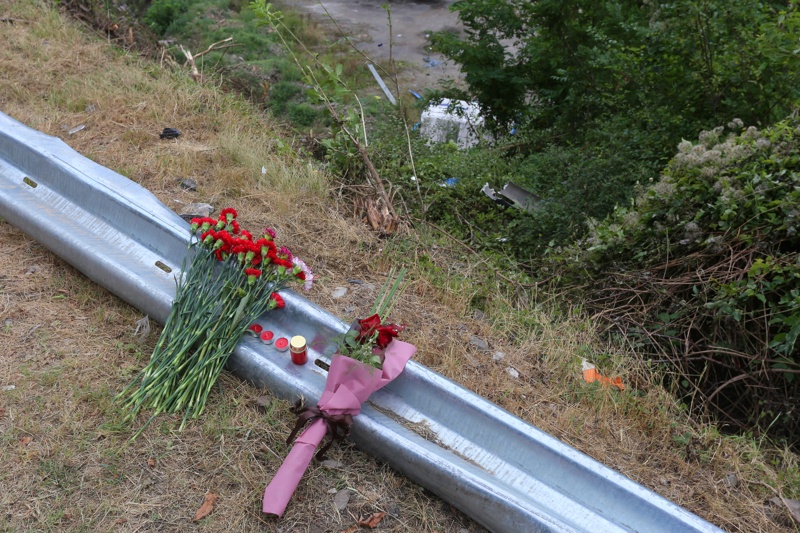
Last August a tragic bus accident occurred near Svoge, claiming 20 lives. Prosecutors have now established that the low quality of the road is prerequisite of the crash. Eight people in total are charged in the case, including two former heads and employees of the National Road Agency (board member Doncho Atanasov resigned as a result form the charges yesterday), employees of the company, which built the road, Trace, and renovation supervisors.
Still, the main reason for the crash remains the driver driving over the speed limit. Grigor Grigorov entered the very sharp corner with 53.5 km/h at a speed limit of 40 km/h.
While the speed remains the chief reason for the crash, experts have now concluded that the quality of the role had a significant role to play as well. The asphalt had a very low traction index, much lower than the minimum allowed for this type of road. Experts also found elements in the asphalt compound, which violate the terms of the contract, which suggest the company swapped part of the materials for cheaper ones. The corner where the bus went off the road didn’t have the proper crash-barriers either, experts concluded.
Bulgaria remains 111 in Press Freedom Index
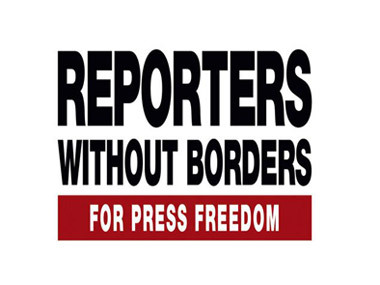
Bulgaria remains at 111 position in Reporters Without Borders’ Press Freedom Index. RWB’s report on Bulgaria is highly critical of systemic corruption in the country and the inneffecient justice system. Bulgarian journalists are a target for organized criminal groups and the government, who abed the violence against the press, instead of combating it, the report says.
The reason for attacks against reporters is investigative efforts into corruption schemes, international traffick, connections between government officials and the mafia and misuse and embezzlement of EU funds. An prominent example for this is the detainment of journalists Dimitar Stoyanov and Atila Biro while investigating EU funds fraud and the GPGate scheme.
Movement for Rights and Freedoms (DPS) MP and media mogul Delyan Peevski is once again the prime antagonist in the report.
“Corruption and collusion between media, politicians and oligarchs is widespread in Bulgaria. The most notorious embodiment of this aberrant state of affairs is Delyan Peevski, who ostensibly owns two newspapers (Telegraph and Monitor) but also owns a TV channel (Kanal 3), news websites and a big chunk of print media distribution. The government continutes to allocate EU funding to media outlets with a complete lack of transparency, with the effect of bribing recipients to go easy on the government in their reporting, or to refrain from covering certain problematic stories altogether. At the same time judicial harassment of independent media, such as the Economedia group, has increased. Threats against reporters have also increased in recent months, to the extent that journalism is now dangerous in Bulgaria”, the report concludes.
Delyan Peevski second in Movement for Rights and Freedoms (DPS) European elections ballot
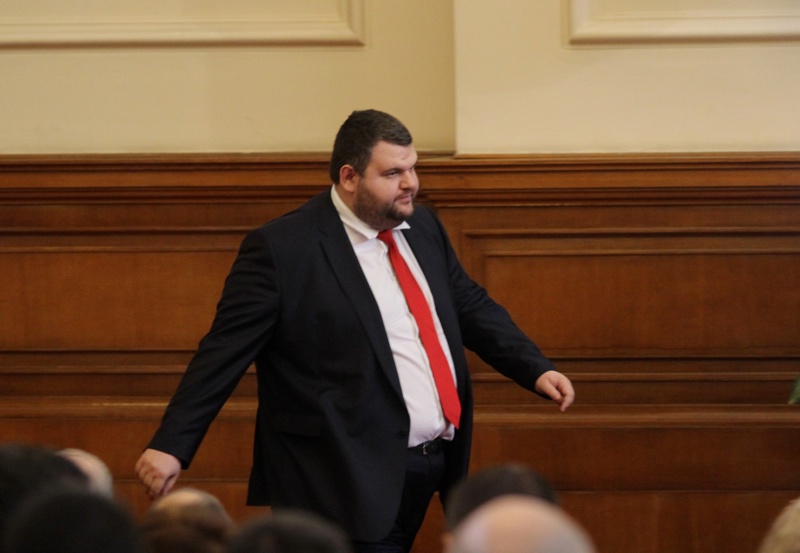
Delyan Peevski
The head of DPS, Mustafa Karadaya will lead the ballot for European elections but it he is expected to withdraw. It is still unclear, however, whether Peevski will do the same, according to reports. DPS’s ballot will be announced officially on Monday.
In the last European election Peevski also tried to get into the European Parliament. Mediapool sources told Mediapool back then that the Alliance of Liberals and Democrats for Europe did not approve of Peevski becoming MP. This was only a year after Peevski was appointed head of the State Agency for National Security, which spiked over-year daily protests in the country. Although this was in 2014, there is indications that the feeling in ALDE have not changed.
Consecutive resignation after real estate fraud
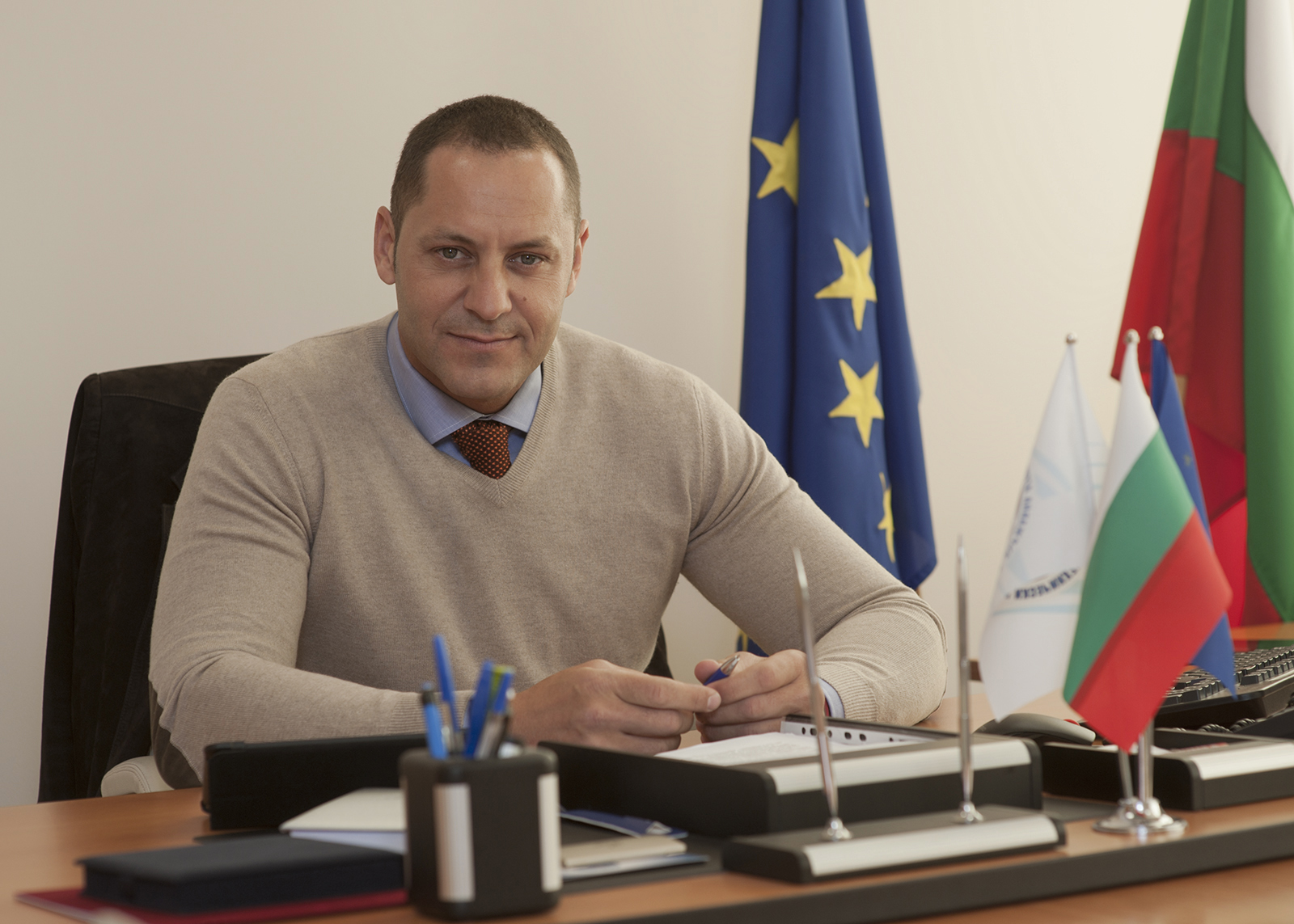
Alexander Manolev
The deputy minister of economy, Alexander Manolov resigned last week after it was discovered he had built a luxurious ‘guest house’ with European funds but only him and his family actually use the house. Prosecutors will investigate his for tax fraud and misuse of EU funds.
A company, which prosecutors claims is a front for Manolev, received almost 400’000 leva to build the house from the Ministry of Agriculture, which operates EU funds. Manolev allocated an additional 700’000 leva as a loan to the company.
A team of reporters from the Bulgarian National Radio went undercover to try and make a reservation in the ‘guest house’ with no success. The house by all standards, operated as private house.
PM Boyko Borissov immediately accepted Manolev’s resignation, who later in the day wrote on Facebook:
“The witch hunt has reached frightening proportions. (…) Several month ago they told me that there are files against me and that the media is planning a new attack. I ignored the warning – after all they tried to do to my family, I thought they could not surprise me. But they once again outdone themselves.”
He goes on similar notes for some time and ends by wishing his GERB collogues good luck and takes a few sentences to make the case of how much they have done in the past ten years in terms of economic growth.
After ApartmentGate GERB loses lead to largest opposition: pools
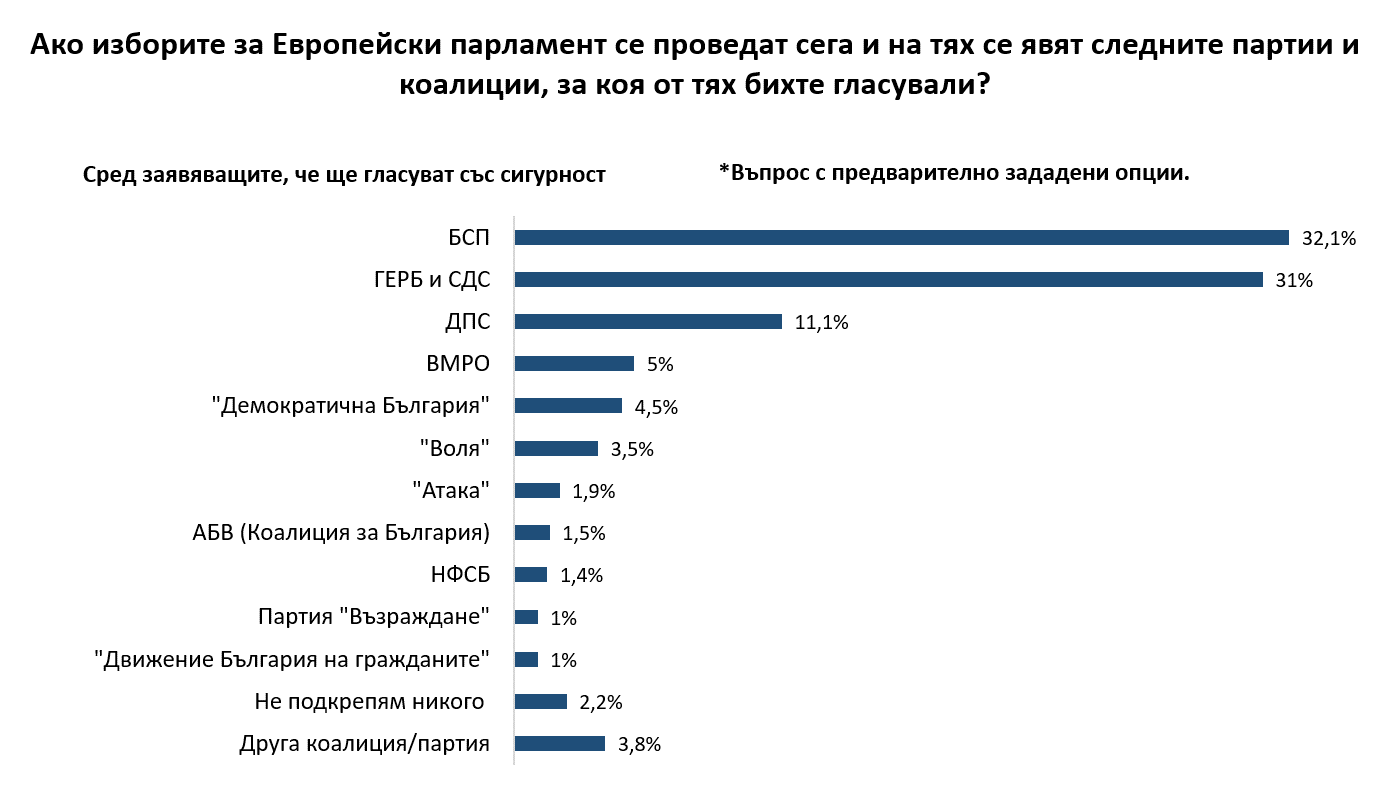
Graph: Gallup nternational
The most recent polls by two separate agencies – Gallup International and Trend – show that the ApartmentGate scandal has reflected poorly on GERB electoral support. The larges parliamentary opposition, the Bulgarian Socialist Party is now in the lead by a point to GERB for the upcoming European elections. This is about a three-point drop for GERB. The two agencies stress, however, that, first, the lead is small, and second, the official campaign has not yet begun, and it is still impossible to predict whether this will prove sustainable going into the actual campaign.
The largest non-parliamentary opposition, Democratic Bulgaria registers 4,5% and 4,3% electoral support in the two polls.
Ключови думи
За честна и независима журналистика
Ще се радваме, ако ни подкрепите, за да може и занапред да разчитате на независима, професионална и честна информационно - аналитична медия.
 0 коментара
0 коментара
Екипът на Mediapool Ви уведомява, че администраторите на форума ще премахват всички мнения, съдържащи нецензурни квалификации, обиди на расова, етническа или верска основа.
Редакцията не носи отговорност за мненията, качени в Mediapool.bg от потребителите.
Коментирането под статии изисква потребителят да спазва правилата за участие във форумите на Mediapool.bg
Прочетете нашите правила за участие във форумите.
За да коментирате, трябва да влезете в профила си. Ако нямате профил, можете да се регистрирате.
